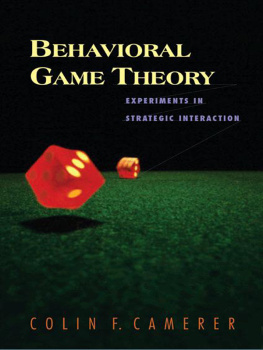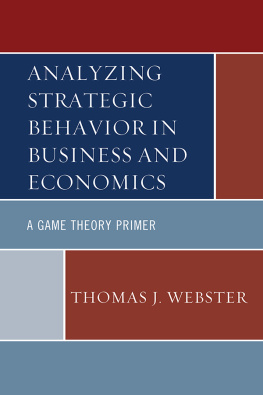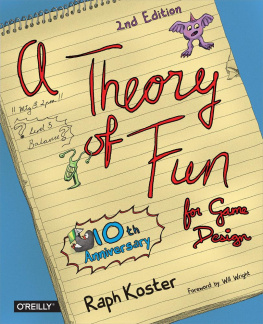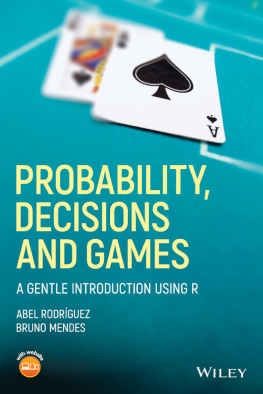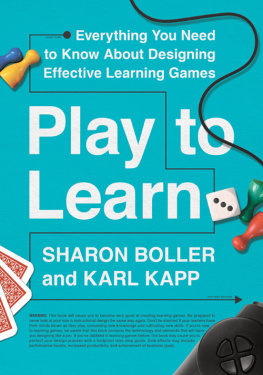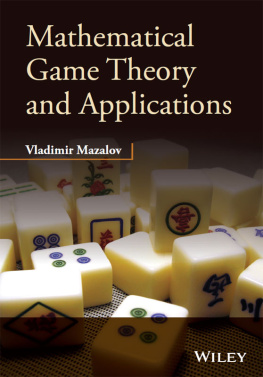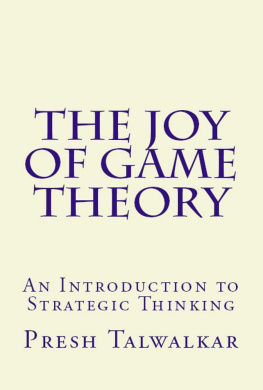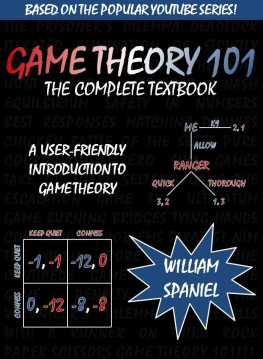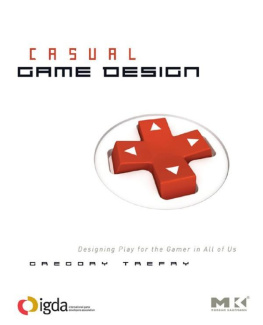The Roundtable Series in Behavioral Economics
The Roundtable Series in Behavioral Economics aims to advance research in the new interdisciplinary field of behavioral economics. Behavioral economics uses facts, models, and methods from neighboring sciences to establish descriptively accurate findings about human cognitive ability and social interaction and to explore the implications of these findings for economic behavior. The most fertile neighboring science in recent decades has been psychology, but sociology, anthropology, biology, and other fields can usefully influence economics as well. The Roundtable Series publishes books in economics that are deeply rooted in empirical findings or methods from one or more neighboring sciences and advance economics on its own termsgenerating theoretical insights, making more accurate predictions of field phenomena, and suggesting better policy.
Colin Camerer and Ernst Fehr, Series Editors
The Behavioral Economics Roundtable
| Henry Aaron | George Loewenstein |
| George Akerlof | Sendhil Mullainathan |
| Linda Babcock | Matthew Rabin |
| Colin Camerer | Thomas Schelling |
| Peter Diamond | Eldar Shafir |
| Jon Elster | Robert Shiller |
| Ernst Fehr | Cass Sunstein |
| Daniel Kahneman | Richard Thaler |
| David Laibson | Richard Zeckhauser |
Behavioral Game Theory
Experiments in Strategic Interaction
Colin F. Camerer
Russell Sage Foundation, New York, New York
Princeton University Press, Princeton, New Jersey
Copyright 2003 by Russell Sage Foundation
Requests for permission to reproduce materials from this work should be sent to Permissions, Princeton University Press
Published by Princeton University Press,
41 William Street,
Princeton, New Jersey 08540
In the United Kingdom: Princeton University Press,
3 Market Place, Woodstock, Oxfordshire OX20 1SY
and Russell Sage Foundation,
112 East 64th Street, New York, New York 10021
All Rights Reserved
Library of Congress Cataloging-in-Publication Data
Camerer, Colin, 1959
Behavioral game theory : experiments in strategic interaction / Colin F. Camerer.
p. cm.
Includes bibliographic references and index.
ISBN 0-691-09039-4 (alk. paper)
1. Game theory. 2. Statistical decisions. 3. NegotiationMathematical models. 4. Decision making. I. Title. II. Series.
HB144 .C364 2003
330'.01'5193dc21
2002034642
British Library Cataloging-in-Publication Data is available
This book was composed in ITC New Baskerville with ZZTEX by Princeton Editorial Associates, Inc., Scottsdale, Arizona
Printed on acid-free paper. 
www.pup.princeton.edu
www.russellsage.org
Printed in the United States of America
10 9 8 7 6 5 4 3 2 1
To my parents
Preface
IN ECONOMICS AT THE UNIVERSITY OF CHICAGO in the late 1970s, game theory was considered a messy analytical swamp between monopoly and perfect competition. My intermediate price theory teacher explained cynically how von Neumann and Morgenstern had both solved one problem that was no longer a problem (by giving a method to measure utilities, which was not needed after the ordinal revolution) and failed to solve the hard problem (uniqueness of equilibrium in all games). In class we therefore stuck to the important polar cases and hoped that two firms would be perfectly competitive, so we didn't need game theory. Fortunately, my first job in 1981 (a de facto postdoc) was up the road at Northwestern which had an unbelievable all-star team of game theorists in its MEDS DepartmentBengt Holmstrom, Ehud Kalai, Paul Milgrom, Roger Myerson, John Roberts, Mark Satterth- waite. You couldn't help but learn some game theory, and get excited about it, just breathing the air in seminars. But my background in cognitive psychology and behavioral decision research also made it natural to look at games and ask how people with cognitive limits and emotionsi.e., normal peoplewould behave.
So the roots of this book go back at least that far. A conference organized to honor Hilly Einhorn, who died tragically young, gave me a chance to put ideas on paper (published in 1990) and coin the term behavioral game theory for the empirical, descriptive approach rooted in data and psychological fact.
People who have influenced me intellectually (in loosely chronological order) include my thesis advisors, Hilly and Robin Hogarth, Charlie Plott (who taught a Ph.D. course at Chicago in 1980 which changed the course of my research), Ken MacCrimmon, Howard Kunreuther, Daniel Kahneman, Paul Slovic, Amos Tversky, John Kagel, George Loewenstein, Jon Baron, Eric Johnson, Dick Thaler, Matthew Rabin, Marc Knez, Teck Ho, Kuan Chong, and my students and many other collaborators.
This book has been a long time in the making, and it has benefited from ideas of many people. It was supported by a wonderful year at the Center for Advanced Study in the Behavioral Sciences in 1997-98. (Is it possible to have a bad year there? It poured rain the whole time and it was still fun.) Hundreds of seminar participants, and my colleagues in the MacArthur Norms and Preferences Network, have shaped my thinking over the years. Students in my Psychology 101 class at Caltech, colleagues Bruno Broseta, Miguel Costa-Gomes, John Kennan, RobertoWeber, and in particular Vince Crawford, and three anonymous referees all commented helpfully on the manuscript. Research assistants Chris Anderson, Dan Clendenning, Ming Hsu, and Angela Hung helped with graphics and editorial support. Gail Nash, Rachel Kibble, and especially the tireless Karen Kerbs did amazing work on the manuscript with great aplomb. Thanks also to Peter Dougherty of Princeton University Press for unflagging cheerleading, sage advice at all the right moments, and some cool free books. Timely moral support was provided throughout by Peter, and by a fortune cookie from the local Chinese delivery place. Their message arrived just before I finished the tedious process of reviewing the copyediting. It saidno lieYou are soon to achieve perfection.
The book is written so that the reader can either dive or snorkel. Snorkeling means swimming along the surface, looking at the pretty fish but not going so deep that you need special equipment (e.g., intimate knowledge of game theory) to breathe. Snorkelers should appreciate highlights of crucial facts about what has been learned from experiments relative to theory, and how those findings suggest new theory (summarized in section summaries). Divers will want to explore the details of studies and make their own judgments about what was learned and important.
I have also skimped on, or omitted, extremely important areas because they are either well covered elsewhere or simply overwhelmingespecially experiments on cooperative games, unstructured bargaining (see Roth, 1995b, for more on this subject), public goods and prisoners' dilemma games, and auctions (see Kagel, 1995, or Kagel and Levin, in press).
I have followed certain writing conventions. My goal is to convey the regularities that have been discovered in experimental studies of game theory, and a feeling for the care, craftsmanship, and conventions of the experimental method. Some studies have been overemphasized and some deemphasized. My preference is to describe the first or last studies and the most solid or interesting results. In summarizing results, the goal is full disclosure without clutter and irrelevance. If you are curious about a detail of the experiments or data that have not been reported, they probably were omitted because they do not matter (or were omitted in the original published reporting); however, I would be horrified if you took this as an excuse to forgo looking at the original article if you are

